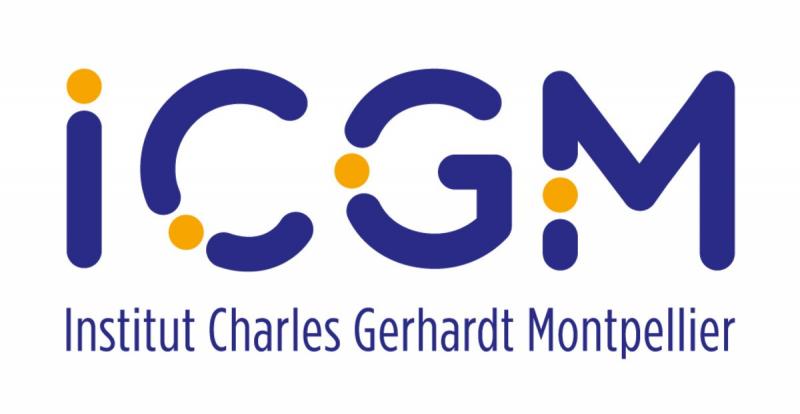Hydrogel-Coated Mediated Enzymatic Electrodes for continuous CO₂-to-Formate Conversion
| ABG-133423 | Master internship | 6 months | 680 |
| 2025-09-16 |

- Chemistry
- Biochemistry
- Materials science
Employer organisation
Website :
The Charles Gerhardt Montpellier Institute (UMR 5253) is a multidisciplinary research laboratory comprising five departments with a total of nearly 500 staff. The ICGM contributes to the development of research in chemistry with the aim of developing and characterizing complex materials with high societal impact, particularly in the fields of health, the environment, and energy.
Its expertise across the entire chain of skills involved in developing complex materials positions ICGM's research activities favorably not only in Montpellier but also nationally and internationally.
The project “Materials chemistry for the benefit of people and society,” led by the entire UMR, is structured around five complementary areas:
- Molecular materials
- Macromolecular materials
- Porous and hybrid materials (D3)
- Materials for energy
- Theoretical physical chemistry
These five areas, which interact closely with each other, enable research to be organized around the different time and space scales that need to be mastered in order to design innovative complex functional materials for applications in the fields of health, the environment, and energy.
One of the cornerstones of all this research is the desire to understand and use different types of intermolecular interactions to propose synthesis strategies that highlight cooperative processes and synergies between different functional motifs.
Description
Formate dehydrogenase from Methylorubrum extorquens (MeFoDH1) is a key metalloenzyme that catalyses the reduction of carbon dioxide (CO2) to formate, making it highly valuable for neutralization of extensive CO2 emissions from high industrial output to mitigate the global warming and climate change [Green Chem. 22, 2020, 3727]. The CO2 conversion based on direct electron transfer (DET) mechanism is challenging due to deeply buried redox-active sites, which are not easily accessible to the electrode [Sci. Rep. 14, 2024, 3819]. Various electrode functionalization strategies have been employed to facilitate DET, but proper orientation of the active site near the electrode remains difficult. To address this, researchers are exploring mediated electron transfer (MET) systems using small redox molecules as electron shuttles [ACS Energy Lett. 5, 2020, 321–327]. The choice of mediator is crucial, as it determines reaction potential, immobilization strategy, and guides selection of the most suitable redox mediator. In addition, hydrogel coatings coupled to MET represents a promising strategy to overcome immobilization challenges by significantly enhancing the stability of bioelectrochemical systems. These three-dimensional hydrophilic polymer networks [Sens. Actuators B Chem. 2016, 236, 343] enable co-immobilization of enzymes and mediator on electrodes while preserving their native conformation, which helps maintain catalytic activity over extended operation.
This project aims to identify optimal mediators for MeFoDH1 by screening viologens and organic mediators with tunable redox potentials, and to assess hydrogel-based coatings for enhancing the stability of the mediated bioelectrochemical system. The work will be conducted at the Balard building (CNRS, Montpellier) within the ANR CO2FFEE project, in the D3-MPH department with a multidisciplinary team and close collaboration with a PhD student and postdoctoral researcher.
The student will be responsible for:
• Synthesis and characterization of original mediators, including NMR (1H, 13C) and electrochemical properties (redox potential, electron transfer rate)
• Screening of a set of redox mediators and assessment of their bio-electrochemical performance with MeFoDH1 on carbon electrode platform
• Investigation of hydrogel coating strategies to improve the stability of mediated bioelectrochemical systems
• Analysis and interpretation of data, comparison with literature, presentation of results in weekly meetings, and preparation of monthly and final reports
Profile
Master's degree student or Engineering school student (M/F) with a background in electrochemistry, along with an interest in organic chemistry, nanomaterials and biochemistry
The ability to communicate effectively in English is essential, as one of the supervisors is English-speaking.
Interdisciplinary topic: excellent openness and curiosity
Required qualities: motivation, autonomy, rigour, teamwork
Starting date
Vous avez déjà un compte ?
Nouvel utilisateur ?
Get ABG’s monthly newsletters including news, job offers, grants & fellowships and a selection of relevant events…
Discover our members
 Laboratoire National de Métrologie et d'Essais - LNE
Laboratoire National de Métrologie et d'Essais - LNE  Ifremer
Ifremer  MabDesign
MabDesign  Institut Sup'biotech de Paris
Institut Sup'biotech de Paris  TotalEnergies
TotalEnergies  ONERA - The French Aerospace Lab
ONERA - The French Aerospace Lab  ADEME
ADEME  SUEZ
SUEZ  Tecknowmetrix
Tecknowmetrix  CESI
CESI  ANRT
ANRT  Groupe AFNOR - Association française de normalisation
Groupe AFNOR - Association française de normalisation  PhDOOC
PhDOOC  Généthon
Généthon  Aérocentre, Pôle d'excellence régional
Aérocentre, Pôle d'excellence régional  CASDEN
CASDEN  MabDesign
MabDesign  Nokia Bell Labs France
Nokia Bell Labs France  ASNR - Autorité de sûreté nucléaire et de radioprotection - Siège
ASNR - Autorité de sûreté nucléaire et de radioprotection - Siège
